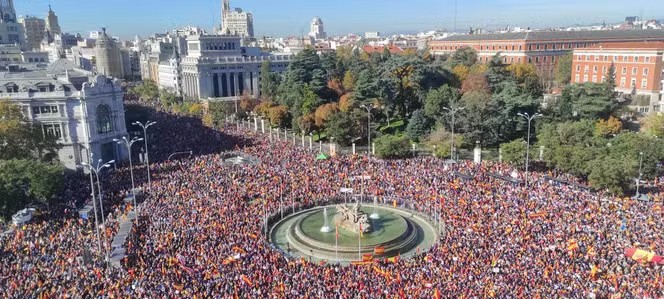Tens of thousands of demonstrators filled the streets of central Madrid on Sunday, in one of the largest public displays of opposition to Prime Minister Pedro Sánchez’s government since the start of his premiership. The protest, led by right-wing parties and civic groups, signals growing resistance to Sánchez’s handling of national unity, judicial reforms, and his alliance with Catalan separatists.
Organisers claimed over 100,000 people took part, though government officials put the figure closer to 50,000. Regardless of the precise count, the turnout was enough to bring parts of the capital to a standstill, as demonstrators marched with Spanish flags and placards denouncing Sánchez’s “betrayal of Spain”.
The central grievance among protestors is the controversial amnesty law pushed forward by the ruling Socialist Workers’ Party (PSOE) and its leftist coalition partners. The law, aimed at granting legal clemency to Catalan separatists involved in the 2017 independence bid, has sparked widespread criticism among conservatives and centrists alike. Opponents argue it undermines the rule of law and appeases those who openly defied the Spanish constitution.
Sánchez, who narrowly secured a second term last year with the backing of Catalan and Basque nationalist parties, has defended the amnesty as a pragmatic step towards reconciliation. Yet for many Spaniards, particularly those outside the autonomous regions, the move has stoked fears of national fragmentation and political opportunism.
Sunday’s protest was supported by Spain’s conservative Partido Popular (PP) and the far-right Vox party, both of which have stepped up calls for new elections. Alberto Núñez Feijóo, leader of the PP, described Sánchez’s government as “a hostage to separatists”, while Santiago Abascal of Vox labelled the coalition “a danger to Spain’s survival”.
The protest also tapped into broader discontent with Sánchez’s leadership style, including his centralisation of judicial appointments and perceived erosion of institutional independence. While the prime minister has managed to maintain a fragile coalition majority, the mounting social pressure could complicate his legislative agenda in the months ahead.
Public frustration has also been fuelled by economic concerns, with rising housing costs, stubborn inflation, and youth unemployment weighing heavily on sentiment. Though Spain has outperformed some eurozone peers in recent growth figures, critics argue that the benefits of recovery have not reached ordinary citizens.
As the country moves into a potentially volatile summer period, the Sánchez government faces growing scrutiny both domestically and from Brussels. EU officials have so far refrained from overt criticism, but concerns about judicial independence and the politicisation of legal reforms have been quietly registered.
The government, for its part, has downplayed the protest, suggesting it was politically orchestrated and unrepresentative of mainstream opinion. Yet the sheer scale of the demonstration suggests that public trust in Sánchez’s leadership is under significant strain.
With no immediate electoral challenge on the horizon, the prime minister may choose to ride out the storm. But Sunday’s protest underscores the deep divisions in Spanish society and the fragile balance sustaining his coalition—a balance that could shift dramatically if tensions continue to rise.
newshub finance




Recent Comments